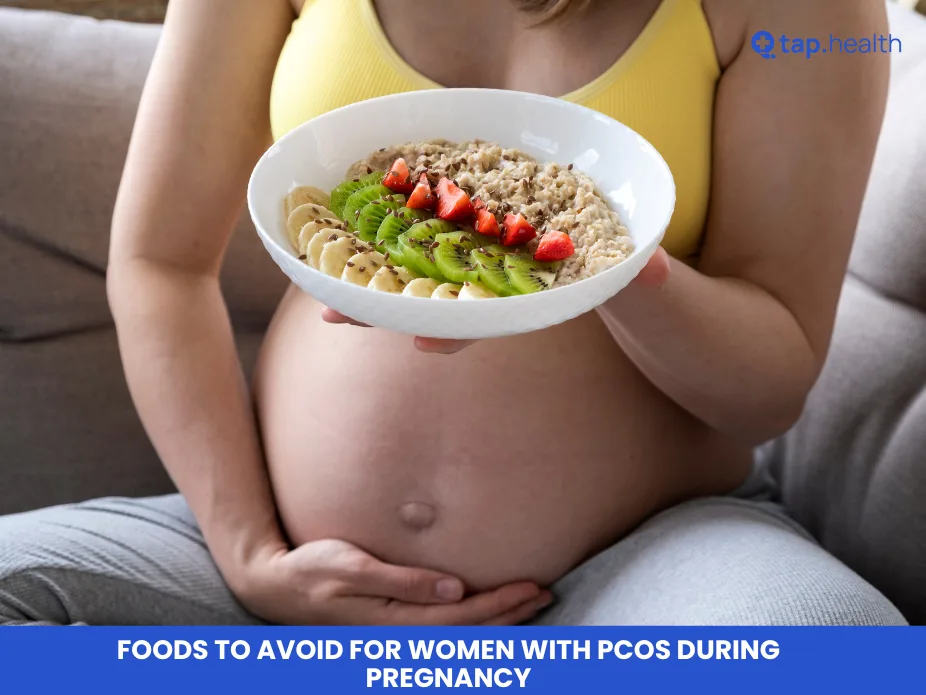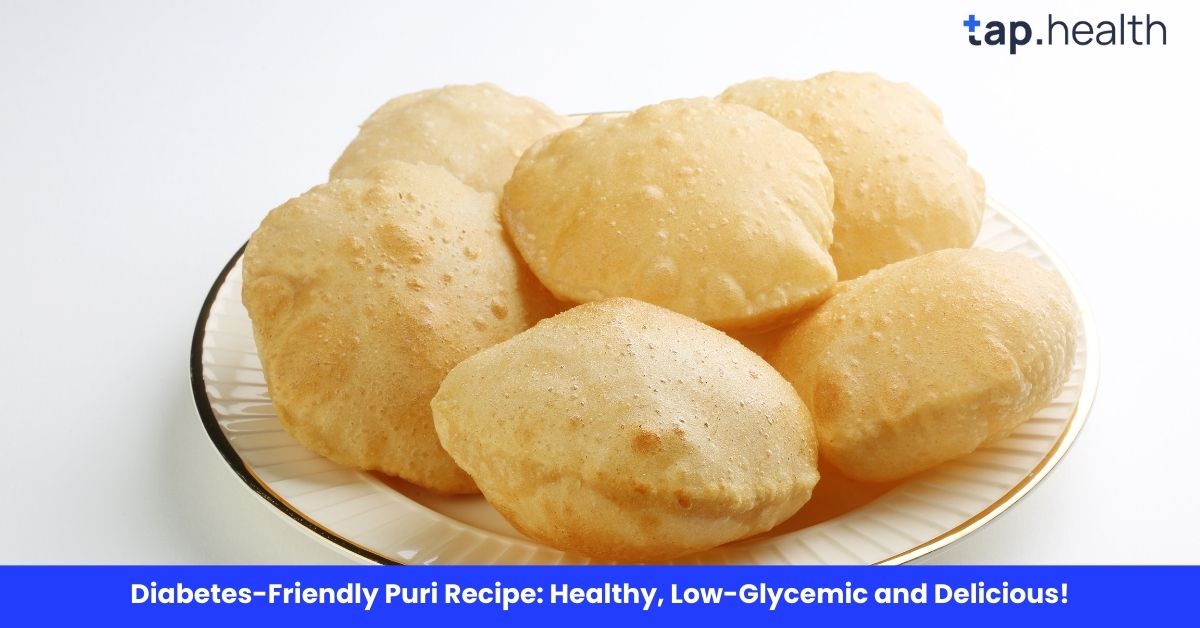Polycystic Ovary Syndrome (PCOS) is one of the most common hormonal disorders affecting women, and when it’s combined with pregnancy, special care is needed to manage symptoms and ensure the health of both mother and baby. Women with PCOS often face issues like insulin resistance, weight gain, and hormone imbalances, which can be exacerbated during pregnancy if not carefully managed. One of the most effective ways to manage PCOS symptoms is through diet.
In this blog post, we will highlight the foods to avoid for women with PCOS during pregnancy and explain why certain foods may worsen PCOS symptoms. We’ll also provide insights into how a well-balanced diet can help control insulin levels, promote a healthy pregnancy, and support your baby’s development.
What is PCOS and How Does It Affect Pregnancy?
Polycystic Ovary Syndrome (PCOS) is a condition that affects a woman’s hormone levels, leading to symptoms such as irregular periods, excess hair growth, acne, and infertility. It is also closely associated with insulin resistance, a condition where the body’s cells become less responsive to insulin, causing elevated blood sugar levels. This is particularly important during pregnancy, as high blood sugar can lead to complications like gestational diabetes, preeclampsia, and premature birth.
Managing PCOS during pregnancy requires careful attention to diet, exercise, and monitoring blood sugar levels. In particular, making healthy food choices can help manage insulin levels, promote weight control, and reduce the risk of pregnancy-related complications.
Foods to Avoid for Women with PCOS During Pregnancy
While many foods are beneficial for managing PCOS, there are certain foods that can worsen insulin resistance, increase inflammation, and contribute to excessive weight gain. By avoiding these foods, you can support your body and help reduce the risk of complications during pregnancy.
1. Refined Carbohydrates and Sugary Foods
Refined carbohydrates, such as white bread, pasta, and baked goods, as well as sugary snacks and beverages, can cause rapid spikes in blood sugar levels. These spikes lead to an increase in insulin production, which can worsen insulin resistance — a common issue in women with PCOS.
Examples to Avoid:
- White bread and pasta
- Pastries, cakes, and donuts
- Soda, sweetened teas, and sugary juices
- Candy and sugary snacks
Why to Avoid: High-glycemic foods lead to blood sugar spikes, increasing the risk of gestational diabetes and contributing to excessive weight gain. Women with PCOS are already at a higher risk of developing insulin resistance, so avoiding these foods can help keep blood sugar levels more stable.
2. Processed and Packaged Foods
Packaged foods, which often contain high levels of sodium, unhealthy fats, preservatives, and refined sugars, are a big no-no for women with PCOS, especially during pregnancy. These foods can increase inflammation and contribute to hormonal imbalances, which can worsen PCOS symptoms and pregnancy complications.
Examples to Avoid:
- Frozen meals
- Chips and snack foods
- Canned soups with high sodium
- Pre-packaged deli meats
Why to Avoid: These foods are often high in unhealthy fats and preservatives that can lead to inflammation, weight gain, and increased insulin resistance. Additionally, high sodium content can elevate blood pressure, which can be dangerous during pregnancy, especially for women at risk of preeclampsia.
3. Trans Fats and Fried Foods
Trans fats, often found in fast foods and processed snacks, can increase inflammation in the body and worsen insulin resistance. These unhealthy fats also contribute to weight gain and increase the risk of cardiovascular disease, making them particularly harmful for women with PCOS during pregnancy.
Examples to Avoid:
- Fast food (fried chicken, fries)
- Commercially baked goods (cakes, cookies)
- Margarine and hydrogenated oils
- Packaged snack foods (potato chips, crackers)
Why to Avoid: Trans fats can disrupt hormonal balance, increase bad cholesterol (LDL), and contribute to cardiovascular problems. Women with PCOS already face an increased risk of heart disease, so it’s essential to avoid foods high in trans fats during pregnancy.
4. High-Sugar Dairy Products
While dairy can be a good source of calcium and protein during pregnancy, some high-sugar dairy products may not be the best option for women with PCOS. Dairy products that are high in sugar, like flavored yogurts or ice cream, can contribute to insulin resistance and weight gain, making it more difficult to manage PCOS symptoms during pregnancy.
Examples to Avoid:
- Sweetened yogurts
- Ice cream and other sugary dairy desserts
- Flavored milk (chocolate or strawberry milk)
Why to Avoid: These sugary dairy products can cause insulin spikes and make it harder to control blood sugar levels. Opting for unsweetened dairy or plant-based alternatives may be a healthier choice for women with PCOS during pregnancy.
5. Alcohol
Although alcohol is generally not recommended during pregnancy due to potential risks to the developing baby, it can also negatively impact women with PCOS. Alcohol can affect liver function and disrupt blood sugar regulation, which can worsen insulin resistance and interfere with the body’s ability to absorb nutrients.
Examples to Avoid:
- Beer
- Wine
- Cocktails and mixed drinks
Why to Avoid: Alcohol can interfere with hormonal balance, increase blood sugar levels, and cause liver damage. Since women with PCOS are already at an increased risk of insulin resistance and metabolic issues, it is best to avoid alcohol during pregnancy altogether.
6. High-Glycemic Fruits
While fruit is generally healthy, some fruits are higher in sugar and can cause rapid spikes in blood sugar, particularly if consumed in large amounts. High-glycemic fruits can worsen insulin resistance in women with PCOS, making it harder to manage blood sugar levels during pregnancy.
Examples to Avoid:
- Grapes
- Watermelon
- Pineapple
- Bananas (especially ripe bananas)
Why to Avoid: High-glycemic fruits can cause blood sugar levels to rise quickly. It’s best to choose fruits with a lower glycemic index, such as berries, apples, and pears, which have a less pronounced effect on blood sugar.
7. Caffeine
While moderate caffeine intake is generally considered safe during pregnancy, excessive caffeine can lead to dehydration, increased heart rate, and spikes in blood pressure, which are risks that women with PCOS should be cautious about. Caffeine can also interfere with sleep, which is important for managing PCOS symptoms.
Examples to Avoid:
- Coffee (especially high-caffeine varieties)
- Energy drinks
- Excessive amounts of tea or soda with caffeine
Why to Avoid: High caffeine consumption can contribute to anxiety, disrupt hormonal balance, and elevate blood pressure. Additionally, sleep disturbances due to caffeine intake can worsen PCOS symptoms.
What to Eat Instead: Healthy Alternatives for Women with PCOS During Pregnancy
While it’s important to know which foods to avoid, it’s equally important to focus on what you should be eating. A well-balanced diet can help manage insulin resistance, reduce inflammation, and promote healthy pregnancy outcomes. Here are some foods to focus on:
1. Whole Grains
Opt for whole grains like quinoa, brown rice, oats, and whole wheat bread. These complex carbohydrates have a lower glycemic index and help stabilize blood sugar levels.
2. Lean Proteins
Lean proteins, such as chicken, turkey, fish, tofu, and legumes, are excellent choices for women with PCOS. They help build muscle, maintain energy, and promote a healthy metabolism.
3. Healthy Fats
Include healthy fats from sources like avocados, nuts, seeds, and olive oil. These fats help reduce inflammation and support hormonal health.
4. Low-Glycemic Fruits
Fruits like berries, apples, pears, and cherries have a lower glycemic index and are high in fiber, making them great options for women with PCOS.
5. Vegetables
Non-starchy vegetables, such as leafy greens, broccoli, cauliflower, and zucchini, are rich in fiber, vitamins, and minerals that support overall health and help stabilize blood sugar.
6. Legumes and Beans
Beans, lentils, and chickpeas are high in fiber and protein, which can help regulate blood sugar levels and support digestive health.
Expert Contributions: What Do Healthcare Providers Say?
Dr. Lisa Green, a gynecologist with experience in managing PCOS during pregnancy, emphasizes the importance of a balanced diet. “Women with PCOS should focus on a diet rich in whole, unprocessed foods, high in fiber, and low in refined sugars and trans fats. This can help reduce the symptoms of PCOS and minimize the risk of complications such as gestational diabetes and preeclampsia.”
She also adds, “It’s important to work closely with your healthcare provider to develop a diet plan that supports both your health and your baby’s development during pregnancy.”
Also read this : Prenatal Vitamins and Diabetes: Essential Nutrients for a Healthy Pregnancy
Recommendations Grounded in Proven Research and Facts
- Choose Low-Glycemic Foods: Focus on whole grains, lean proteins, and vegetables to help control blood sugar levels.
- Avoid Refined Carbs and Sugars: Limit foods that cause rapid blood sugar spikes, including sugary snacks and refined grains.
- Focus on Healthy Fats: Healthy fats like those found in avocados, nuts, and seeds are essential for hormonal balance.
- Stay Hydrated: Drink plenty of water to maintain hydration, support digestion, and reduce bloating.
FAQ: Foods to Avoid for Women with PCOS During Pregnancy
What are the best fruits for women with PCOS during pregnancy?
Fruits with a low glycemic index, such as berries, apples, and pears, are the best choices for women with PCOS during pregnancy. These fruits help keep blood sugar levels stable.
Can I eat dairy if I have PCOS during pregnancy?
Yes, but choose low-fat or unsweetened dairy options. Avoid sugary dairy products, like sweetened yogurts or ice cream, as they can increase insulin resistance.
How can I control blood sugar with PCOS during pregnancy?
Focus on eating whole foods, low-glycemic fruits, vegetables, lean proteins, and healthy fats. Avoid processed foods, refined sugars, and simple carbohydrates.
Is caffeine bad for women with PCOS during pregnancy?
Excessive caffeine intake should be avoided as it can lead to dehydration, elevated blood pressure, and disrupt sleep. Moderate caffeine intake is generally considered safe, but it’s best to consult your doctor.
Conclusion
Managing PCOS during pregnancy is crucial for the health of both the mother and the baby. By avoiding refined carbs, sugary foods, processed snacks, and unhealthy fats, women with PCOS can better control insulin levels, reduce inflammation, and minimize pregnancy complications. A balanced diet rich in whole grains, lean proteins, healthy fats, and low-glycemic fruits is key to managing symptoms and supporting a healthy pregnancy.
For more information, visit the PCOS Awareness Association.



